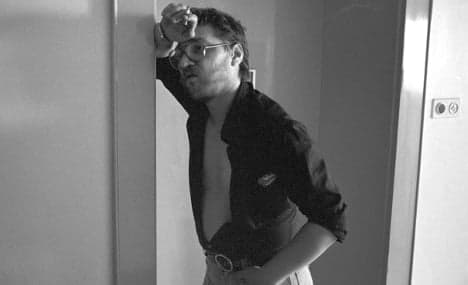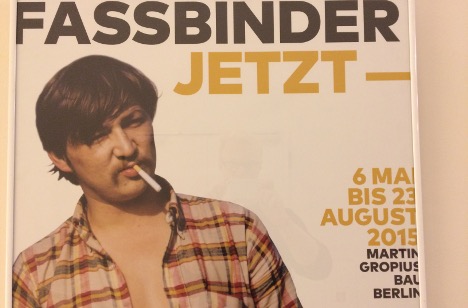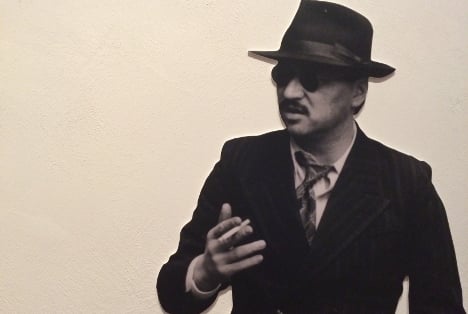Fassbinder: New German Film's Enfant Terrible

On Sunday May 31st, Rainer Weiner Fassbinder, one of the most influential German film directors, would have turned 70 - had it not been for his death at the age of 37 in 1982. The Local takes a look back at the life and work of the enfant terrible of New German Cinema.
Just like the Italian Neorealists had done in the 1950s, and the French New Wave in the 1960s, a new generation of German filmmakers declared "Old cinema is dead. We believe in the new one".
This phrase featured in the Oberhausener Manifesto of 1962, which marked the birth of the movement known as New German Cinema. It would be founded on independent, small budget films that combined an artistic focus on rich cinematography with radical political messages.
German film needed a break from the classical, commercial cinema of the 1940s and 50s, to look forward, and to attempt to re-write the rule book.
From the late 1960s to the early 1980s a group of young directors, including the likes of Werner Herzog, Wim Wenders, and notably Rainer Fassbinder, did exactly this, putting German arthouse cinema firmly back on the map.
In 1977 the New York Times described Fassbinder as "the messiah of New German Film", and he was perhaps the most radical, provocative and subversive of the group. He made over 40 films in his 15-year career before he died of a drug and alcohol induced heart attack in 1982 at the age of 37.
A human cinema
Fassbinder grew up in Munich, and even as a youngster he was wildly independent. By the time he had turned 18 he had already starting writing plays and films, and taking small acting roles.
His theatrical background sparked an interest in Brecht's Verfremdungseffekt, the breaking of the illusion of reality in order to provoke a critical response from the audience rather than an emotional one.
But human beings were always the central focal point of his cinema.

His films often dealt with the down-trodden, persecuted and underdogs in society, and the interrelationships between personal and social structures.
"I just want to tell the stories that need to be told", he once said.
Radical political views constantly run through his films, which often launch full-blooded attacks on bourgeois, capitalist society by exposing its utmost fears and taboos. He was the ultimate iconoclast.
Another of his key themes was the failure of post-war Germany to create a better society after its emergence from the horrors of the Third Reich.
The auteur
The influences of the French New Wave notion of the director as an auteur can be seen in one of his most famous quotes:
"I would like to build a house with my films. Some are the cellar, others the walls, and others the windows. But I hope in the end they will form a house."

Other influences from that period were his admiration for Jean-Luc Godard and his striking use of cinematography. One of his trademark techniques was the circular tracking shot.
The viewer experiences a dizzying and intimate effect as the camera moves around the character in a circle.
In an essay on Fassbinder, Kent Jones writes: "The plasticity of Fassbinder’s images is almost unparalleled—in the sound era, only Carl Theodor Dreyer, Ozu, Robert Bresson, and Jean-Luc Godard at their very best have a similar force and beauty."
Sex, Drugs and Cinema
His short adult life was a chaotic cocktail of an incredible work ethic and creative energy, and a lifestyle of drink, drugs and extra-marital affairs. As a figure he is somewhere between an intellectual and a rock star.
His outrageous lifestyle rarely got in the way of his creative output, as he wrote and directed over 40 feature films, and acted in many of them. If he had lived longer he would have become one of the most prolific directors ever.
A Spiegel article in 1975 wrote that Fassbinder "makes films like other people smoke cigarettes"
He once said the reason for his making so many films was a fear of loneliness, because he could surround himself with people when shooting. He took part in almost every stage of the film-making process.
Loved by many, feared by some. Fassbinder was provocative, controversial and obsessive, but his commitment to his art was unquestionable. For some his open bisexuality was a problem, and others found his films too dangerous or subversive, but he is now considered one of the definitive figures of German art house cinema.
Stern perhaps sums him up best in an article from 1970, saying "he was a boozer and a genius".
Essential Fassbinder:
1) Fear Eats The Soul (1974)
The story of a love affair between a middle aged widow and young Moroccan immigrant, who have to endure exclusion and rejection from family, friends and society.
American director Tod Haynes said this about the film: "The entire film is based on looking. The relationship between the looker and the looked at, and how these looks rigidly define society, which is always based on inclusion and exclusion of some kind." It is one of Fassbinder's most widely praised works and won two prizes at Cannes in 1974.
2) The Marriage of Maria Braun (1979)
Maria marries Hermann Braun at the end of the Second World War, only for him to be killed just before the capitulation. Alone, Maria uses her beauty and ambition to prosper in Germany’s “economic miracle” of the 1950’s.
Fassbinder’s biggest international success and the first part of his “postwar trilogy,” The Marriage of Maria Braun is a heartbreaking exploration of a woman picking herself up from the ruins of her own life, as well as a metaphorical attack on a society determined to forget its past.
3) Berliner Alexanderplatz (1980)
Based on the great modernist novel by Alfred Döblin, this 15-hour long TV series is described by many as his crowning achievement at the end of his career.
Fassbinder’s immersive epic follows the hulking, childlike ex-convict Franz Biberkopf as he attempts to “become an honest soul” amid the corrosive urban landscape of Weimar-era Germany. With equal parts cynicism and humanity, Fassbinder details a mammoth portrait of a common man struggling to survive in a viciously uncommon time
By Matty Edwards
A documentary on Rainer Fassbinder is currently showing in German cinemas, and will be broadcast on June 16th on ARD Television.
There is an exhibition celebrating his 70th birthday at the Martin Gropius Bau in Berlin until August.
Comments
See Also
Just like the Italian Neorealists had done in the 1950s, and the French New Wave in the 1960s, a new generation of German filmmakers declared "Old cinema is dead. We believe in the new one".
This phrase featured in the Oberhausener Manifesto of 1962, which marked the birth of the movement known as New German Cinema. It would be founded on independent, small budget films that combined an artistic focus on rich cinematography with radical political messages.
German film needed a break from the classical, commercial cinema of the 1940s and 50s, to look forward, and to attempt to re-write the rule book.
From the late 1960s to the early 1980s a group of young directors, including the likes of Werner Herzog, Wim Wenders, and notably Rainer Fassbinder, did exactly this, putting German arthouse cinema firmly back on the map.
In 1977 the New York Times described Fassbinder as "the messiah of New German Film", and he was perhaps the most radical, provocative and subversive of the group. He made over 40 films in his 15-year career before he died of a drug and alcohol induced heart attack in 1982 at the age of 37.
A human cinema
Fassbinder grew up in Munich, and even as a youngster he was wildly independent. By the time he had turned 18 he had already starting writing plays and films, and taking small acting roles.
His theatrical background sparked an interest in Brecht's Verfremdungseffekt, the breaking of the illusion of reality in order to provoke a critical response from the audience rather than an emotional one.
But human beings were always the central focal point of his cinema.
His films often dealt with the down-trodden, persecuted and underdogs in society, and the interrelationships between personal and social structures.
"I just want to tell the stories that need to be told", he once said.
Radical political views constantly run through his films, which often launch full-blooded attacks on bourgeois, capitalist society by exposing its utmost fears and taboos. He was the ultimate iconoclast.
Another of his key themes was the failure of post-war Germany to create a better society after its emergence from the horrors of the Third Reich.
The auteur
The influences of the French New Wave notion of the director as an auteur can be seen in one of his most famous quotes:
"I would like to build a house with my films. Some are the cellar, others the walls, and others the windows. But I hope in the end they will form a house."
Other influences from that period were his admiration for Jean-Luc Godard and his striking use of cinematography. One of his trademark techniques was the circular tracking shot.
The viewer experiences a dizzying and intimate effect as the camera moves around the character in a circle.
In an essay on Fassbinder, Kent Jones writes: "The plasticity of Fassbinder’s images is almost unparalleled—in the sound era, only Carl Theodor Dreyer, Ozu, Robert Bresson, and Jean-Luc Godard at their very best have a similar force and beauty."
Sex, Drugs and Cinema
His short adult life was a chaotic cocktail of an incredible work ethic and creative energy, and a lifestyle of drink, drugs and extra-marital affairs. As a figure he is somewhere between an intellectual and a rock star.
His outrageous lifestyle rarely got in the way of his creative output, as he wrote and directed over 40 feature films, and acted in many of them. If he had lived longer he would have become one of the most prolific directors ever.
A Spiegel article in 1975 wrote that Fassbinder "makes films like other people smoke cigarettes"
He once said the reason for his making so many films was a fear of loneliness, because he could surround himself with people when shooting. He took part in almost every stage of the film-making process.
Loved by many, feared by some. Fassbinder was provocative, controversial and obsessive, but his commitment to his art was unquestionable. For some his open bisexuality was a problem, and others found his films too dangerous or subversive, but he is now considered one of the definitive figures of German art house cinema.
Stern perhaps sums him up best in an article from 1970, saying "he was a boozer and a genius".
Essential Fassbinder:
1) Fear Eats The Soul (1974)
The story of a love affair between a middle aged widow and young Moroccan immigrant, who have to endure exclusion and rejection from family, friends and society.
American director Tod Haynes said this about the film: "The entire film is based on looking. The relationship between the looker and the looked at, and how these looks rigidly define society, which is always based on inclusion and exclusion of some kind." It is one of Fassbinder's most widely praised works and won two prizes at Cannes in 1974.
2) The Marriage of Maria Braun (1979)
Maria marries Hermann Braun at the end of the Second World War, only for him to be killed just before the capitulation. Alone, Maria uses her beauty and ambition to prosper in Germany’s “economic miracle” of the 1950’s.
Fassbinder’s biggest international success and the first part of his “postwar trilogy,” The Marriage of Maria Braun is a heartbreaking exploration of a woman picking herself up from the ruins of her own life, as well as a metaphorical attack on a society determined to forget its past.
3) Berliner Alexanderplatz (1980)
Based on the great modernist novel by Alfred Döblin, this 15-hour long TV series is described by many as his crowning achievement at the end of his career.
Fassbinder’s immersive epic follows the hulking, childlike ex-convict Franz Biberkopf as he attempts to “become an honest soul” amid the corrosive urban landscape of Weimar-era Germany. With equal parts cynicism and humanity, Fassbinder details a mammoth portrait of a common man struggling to survive in a viciously uncommon time
By Matty Edwards
A documentary on Rainer Fassbinder is currently showing in German cinemas, and will be broadcast on June 16th on ARD Television.
There is an exhibition celebrating his 70th birthday at the Martin Gropius Bau in Berlin until August.
Join the conversation in our comments section below. Share your own views and experience and if you have a question or suggestion for our journalists then email us at [email protected].
Please keep comments civil, constructive and on topic – and make sure to read our terms of use before getting involved.
Please log in here to leave a comment.